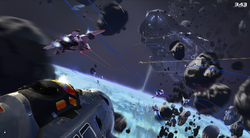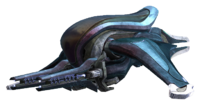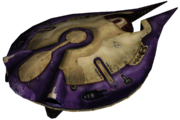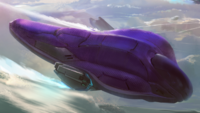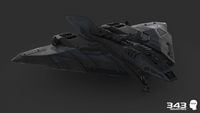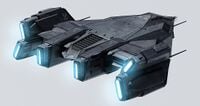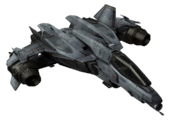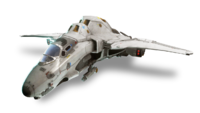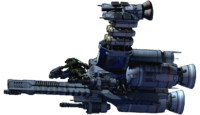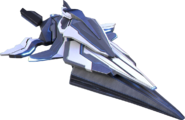Space fighter: Difference between revisions
From Halopedia, the Halo wiki
CMDR RileySV (talk | contribs) (Made some consistency changes.) |
m (→Human: Fixing links) |
||
| Line 30: | Line 30: | ||
===Human=== | ===Human=== | ||
*'''[[GA-TL1 Longsword]]''' - The primary fighter of the UNSC fleet.<ref>''[[Halo Encyclopedia (2009 edition) | *'''[[GA-TL1 Longsword]]''' - The primary fighter of the UNSC fleet.<ref>''[[Halo Encyclopedia (2009 edition)]]'', p. 261</ref> Several known variants of the Longsword exist including the [[C708 Longsword|C708]], [[C709 Longsword|C709]], [[C712 Longsword|C712]] and [[C718 Longsword|C718]] variants. | ||
<gallery> | <gallery> | ||
File:HCEA-LongswordFighter.png|The C709 Longsword. | File:HCEA-LongswordFighter.png|The C709 Longsword. | ||
Revision as of 18:01, July 16, 2021
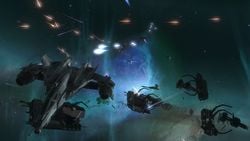
A space fighter,[1] strike fighter,[2][3] or simply fighter,[2][3][4] known by the Covenant as Strikecraft[5][6] and to the UNSC as an interceptor,[7][3] are small, versatile, and maneuverable spacecraft, primarily used for exoatmospheric interception, interdiction, or space-supremacy operations.
Overview
These ships are unable to enter slipspace by themselves, and need to be launched from planetary bases, orbiting space stations, or capital ships to conduct strike-operations against enemy warships, intercept fighters, and provide escort for warships and dropships.[8][9] Their size varies from a few meters to well over 50 meters. Most known space fighters are spaceplanes, capable of operating in both atmospheric/exoatmospheric (A/X) and suborbital/orbital (S/O) environments. The Forerunner Warrior-Servants often used space fighters in combat. Some space fighters, called weapon-ships, could be remotely-controlled at a ratio of up to a million ships per warrior.[10]
Warships primarily designed to transport and maintain fighter-squadrons are commonly known as carriers.[11] In the UNSC Navy, starfighters were deployed from all warships larger than a corvette, as corvettes were too small to carry anything larger than a shuttle.[12] Marathon-class heavy cruisers are capable of reconfiguring themselves as light carriers by sacrificing weapons installations and cargo bays for increased fighter capacity.[13] UNSC doctrine typically dictates the launching of a fighter assault against an enemy fleet employing wolf-pack tactics before it can swarm a capital ship.[14]
During the Battle of Biko, Nizat 'Kvarosee deployed his fighters in a tight "shell" around their motherships, ensuring that any attempt to board his vessels would be met with failure, considered an unusual deployment tactic by the UNSC.[14] This differed from usual Covenant deployment tactics, which would see fighters deploy straight to attack the enemy, leaving their capital ships relatively undefended.[15]
Types
Covenant
- Type-27 Banshee - An exoatmospheric variant of the Type-26 Banshee,[16] it was the standard interceptor support craft of the Covenant fleet.[17]
- Seraph - Seraph is the name of several different space fighters.[18] Two design patterns of that fall under it are the Morsam-pattern (known as the Type-31 Seraph) and the Kai-pattern.
- Tarasque heavy fighter - The Tarasque heavy fighter was an older space fighter.[19]
- Gigas fighter-bomber - The Gigas fighter-bomber was an older craft.[19] Though it still saw deployment as late as 2526 from the Fleet of Swift Justice.[20]
- Griever fighter-bomber - a large craft employed by the Banished.[21]
Human
- GA-TL1 Longsword - The primary fighter of the UNSC fleet.[22] Several known variants of the Longsword exist including the C708, C709, C712 and C718 variants.
- YSS-1000 Sabre - The Sabre is a swift, versatile, and utterly lethal interceptor. Only several hundred were manufactured before the war ended.[7] It could launch from the surface of a planet via a single-stage-to-orbit system.[16]
- F-41 Broadsword - The Broadsword was a type of UNSC interceptor manufactured in the thousands primarily in the Outer Colonies during the Covenant war.[3]
- OF92 Booster Frame - The OF92 Booster Frame is a type of open frame space fighter designed for Spartan operatives.[1]
- S-14 Baselard - The Baselard was a two-seater fighter craft in use by the UNSC as early as 2526.[23]
- S77 Crow - An older fighter designed by private corporations for convoy escort.[24]
- Nandao fighter - The Nandao fighter was a type of fighter used by the UNSC as early as 2526.[25]
Forerunner
- Despair-class fighter - The Despair-class fighter was a Forerunner fighter that was buildable from a ship-seed.[4]
Gameplay
Halo: Reach
During the level Long Night of Solace, the player has the opportunity to fly the YSS-1000 Sabre over Reach. Through the Pilotable Seraph glitch, players are able to fly the Morsam-pattern Seraph as well. For the "Thorage" update in Halo: The Master Chief Collection, the Sabre and Seraph were added to the Forge inventories of Forge World and Tempest - marking the first time a Seraph has been flyable without glitches or exploits.
Halo 4
In the final level Midnight, the player is given the opportunity to fly the F-41E Broadsword through the Forerunner ship Mantle's Approach. For the "Thorage" update which saw Halo 4 brought to PC platforms, the Master Chief Collection version of Halo 4 was updated to make the Broadsword useable in multiplayer. The Broadsword can be spawned in Forge on the maps Impact, Ravine, Erosion and Forge Island.
Production notes
During the development of Halo 2, the UNSC were intended to have a dedicated space fighter during the Battle of Earth. The fighter was nicknamed the "strike fighter", though was cut from the game.
Sources
- ^ a b Halo: Warfleet - Frigates, page 38
- ^ a b Halo 4: The Essential Visual Guide, p. 114
- ^ a b c d Halo: Warfleet - Fighters, page 28-29
- ^ a b Halo Wars 2, Phoenix Logs, Forerunner ship
- ^ Halo: Warfleet - Glossary, page 92
- ^ Halo: Warfleet - Strikecraft, page 58-59
- ^ a b Halo: Warfleet - Carriers, page 40
- ^ Halo Encyclopedia (2009 edition), p. 266
- ^ Halo: First Strike, page 6
- ^ Halo: Cryptum, page 174
- ^ Halo Encyclopedia: The Definitive Guide to the Halo Universe, p. 259
- ^ Halo: Contact Harvest, page 64
- ^ Halo: Fleet Battles - Core Rulebook, page 125
- ^ a b Halo: Silent Storm, chapter 17
- ^ Halo: Silent Storm, chapter 21
- ^ a b Halo: Reach, campaign level Long Night of Solace
- ^ Halo: Reach, game stats
- ^ Halo: The Essential Visual Guide, page 169
- ^ a b Halo 3 - Appearance - Armor - Armor Classification: Elite - Head - Flight description
- ^ Halo: Oblivion, chapter 21
- ^ Halo: Shadows of Reach, chapter 16
- ^ Halo Encyclopedia (2009 edition), p. 261
- ^ Halo: Silent Storm, chapter 19
- ^ Halo: Retribution, chapter 1
- ^ Halo: Oblivion, chapter 12
| ||||||||||||||
